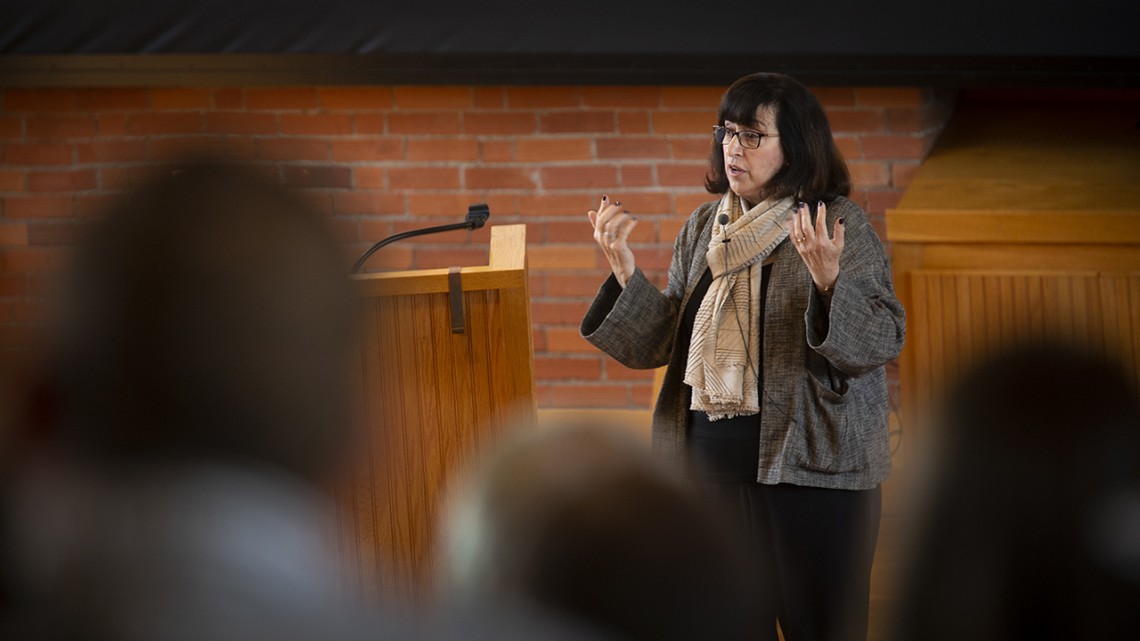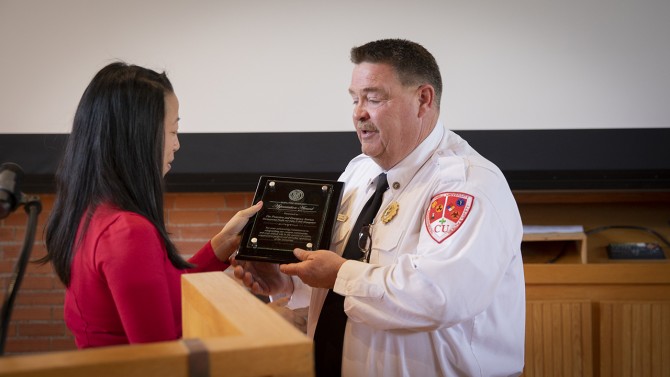
President Martha E. Pollack gives her third annual address to staff Oct. 10 in Rockefeller Hall’s Schwartz Auditorium.
President highlights staff support of Cornell priorities
By Melanie Lefkowitz
The university’s 8,000 staff members, whose expertise ranges from counseling to cooking to carpentry, are integral to Cornell’s mission as a land-grant university and its positive impact on the world, President Martha E. Pollack said in her third annual address to staff.
Speaking Oct. 10 in Rockefeller Hall’s Schwartz Auditorium, Pollack reviewed university priorities, thanked staff for their contributions and fielded questions from an audience of around 200 people – and another 576 via livestream.
“All of you bring an extraordinary range of knowledge and skills to our community, and that tremendous diversity of talent is just essential to making this university the really extraordinary place that it is,” Pollack said. “Without you, nobody learns, nobody teaches, nobody does research, and if that’s not enough – nobody eats!”
Pollack provided updates on four university priorities, starting with academic distinction. The new departments of computational biology, and statistics and data science – as well as the new Institute of Politics and Global Affairs in New York City, and the Center for Social Sciences in Ithaca – all push the boundaries of knowledge and reflect Cornell’s commitment to cross-disciplinary teaching and research, she said.
“Our research enterprise is not only core to our academic distinction, but also to our larger mission of knowledge with a public purpose, in every area of life and endeavor,” Pollack said. “It goes without saying – but I’ll say it anyway – that all of that research, all of it, relies upon the contributions of staff, in too many roles to mention.”
For the second priority, “educational verve,” Pollack described an expansion of the Active Learning Initiative to 40 additional courses, serving a combined 4,500 students, which will now use creative activities, problem solving and technology to make classroom learning more equitable and effective.
Improvements and growth at Cornell Health will help support students’ physical and mental well-being, she said, and the North Campus Residential Expansion, which will add 2,000 beds by fall 2022, will reduce undergraduates’ stress by guaranteeing university housing through their sophomore years. She thanked staff members for accommodating the North Campus construction, particularly during move-in days.
To help with construction-related parking challenges, she said, the university is working on efforts including an automated counting system to tell drivers if there are spots in the parking garage, a shuttle from B Lot, and improvements to the intersections on Cradit Farm Drive.
Pollack also offered an update on the priority of civic responsibility. Last year, Cornell awarded $257 million in grant aid, and saw its lowest percentage undergraduate tuition increase in decades. Thanks to alumni donations, Weill Cornell Medicine’s medical education will now be debt-free to all students qualifying for financial aid, she added.
The university is building and maintaining its campuses sustainably, with efforts including the 18-megawatt Cascadilla Community Solar Farm, which, when completed, will add enough clean energy to power 3,000 residential homes through its 79,000 solar panels. The new North Campus buildings will have rooftop solar arrays and energy use that outperforms New York State Energy Code requirements by 30%.
Finally, addressing the priority of One Cornell, Pollack thanked staff who participated in creating a core values statement, which will help create community across far-flung campuses.
But just because the statement is written doesn’t mean it’s done, she said.
“Our next job is really the most important one, which is making sure that as a community, a community of faculty, of staff and of students, that we live the core values – the values of purposeful discovery, free and open inquiry and expression, being a community of belonging, exploration across boundaries, changing lives through public engagement, and respect for the natural environment,” Pollack said.
She also thanked the Employee Assembly (EA) for sponsoring the event, and for its efforts in ensuring that staff voices are heard.
Before the speech, the EA handed out a thank you of its own – to Fire Protection and Emergency Services, winner of the EA Appreciation Award. Vice chair Hei Hei Depew presented the award to University Fire Marshal Ron Flynn on behalf of his team, which was recognized for safeguarding the Cornell community by enforcing fire codes, reviewing more than 3,500 event registrations a year, providing construction guidance and scheduling more than 700 annual fire inspections, among other efforts.
The other nominees were: Cornell Law School’s building care and facilities staff, Cornell Information Technologies’ (CIT) IT Service Desk, the Central IT Service Group, the New Student Move-In and Orientation team, the Canvas implementation team, and CIT’s video engineering and event services.
Media Contact
Get Cornell news delivered right to your inbox.
Subscribe

